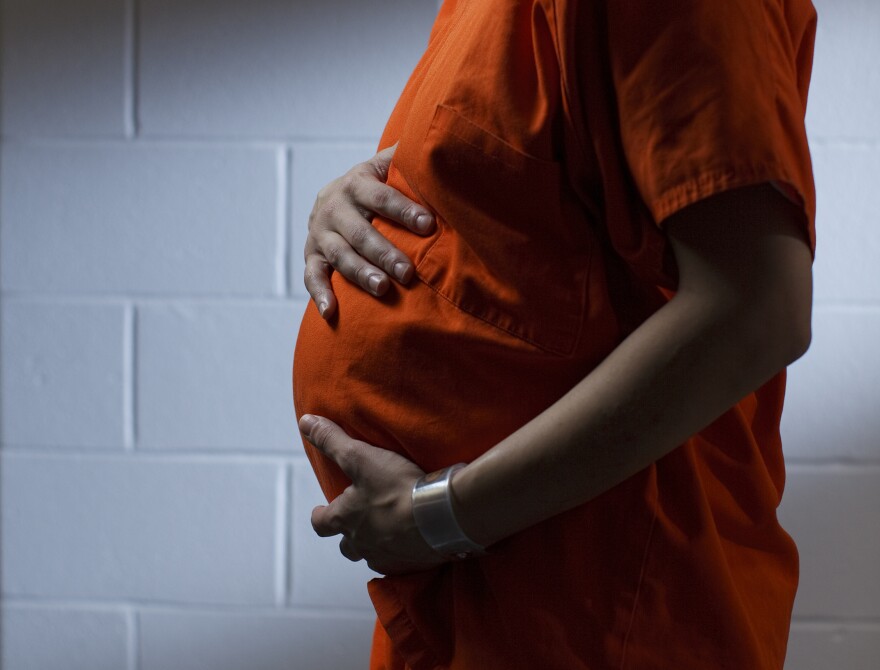The Tennessee legislature gave its final approval to a bill on Thursday that would restrict the use of shackles and other restraints on pregnant inmates — the latest state to limit what medical experts say is a routine but dangerous practice for pregnant people and fetuses.
More than a dozen states have no laws restricting the shackling of pregnant inmates, according to the American College of Obstetricians and Gynecologists, and those that do often make exceptions for public safety or other reasons.
It's unclear exactly how many pregnant inmates are shackled or restrained each year, but experts say it still occurs in U.S. prisons and jails, where an estimated 58,000 pregnant women pass through annually.
A 2018 study found that, among hospital nurses who said they cared for incarcerated women during pregnancy or the postpartum period, 82.9% reported that their incarcerated patients were shackled "sometimes to all of the time."
"It's a very demeaning and dangerous practice," Corene Kendrick, deputy director of the ACLU National Prison Project, told NPR.
"A lot of these policies that prison systems have about shackling people when they go to outside medical care are just absurd," Kendrick added.
The medical community opposes shackling pregnant inmates
Medical experts roundly criticize the practice of shackling pregnant inmates. National organizations — from the American College of Obstetricians and Gynecologists to the American Medical Association to the Association of Women's Health, Obstetric and Neonatal Nurses — oppose it, or support restrictions.
Dr. Carolyn Sufrin, an associate professor at the Johns Hopkins School of Medicine, says having an inmate shackled during labor and delivery presents challenges for doctors and nurses.
For example, if medical staff detect a deceleration in the fetal heart rate and are worried about fetal distress, they may want to have the pregnant inmate change positions. In other cases, if an inmate requires emergency C-section, they'll need to be quickly transferred to the operating room.
"All of those things are impeded if that person is shackled to the bed, and we don't have time to be negotiating with an officer to unlock the restraints so that we can provide emergency, time-sensitive medical care," Sufrin said.
Even before labor and delivery, pregnant inmates who are shackled face other hazards, such as blood clots. Sufrin said restrained inmates are also at a higher risk of falling and are unable to break their fall, which could result in bleeding or even stillbirth.
The practice is not universally banned across the U.S.
Despite the widespread opposition to shackling pregnant inmates, not all states prohibit it by law.
At least 37 states have laws limiting the shackling of pregnant inmates, after Alabama Gov. Kay Ivey signed a measure into law last week.
Some of those states go as far as banning shackling throughout pregnancy as well as during labor, delivery and the postpartum recovery period.
Federal law also restricts the practice. The First Step Act, signed into law by President Donald Trump in 2018, bars the use of restraints on pregnant people in the custody of the Federal Bureau of Prisons and the U.S. Marshals Service.
Sufrin said these kinds of laws are necessary now because prisons and jails were never contemplated to house and provide health care for pregnant people.
"The reason that we have to have a law, to me, is because our carceral system is fundamentally gendered to imagine the default prisoner as male," she said.
Even among the laws that do exist, there frequently are exceptions if officials believe a pregnant inmate may attempt to flee or harm others.
Tennessee is the latest state to move toward limiting restraints on pregnant inmates
According to Tennessee lawmakers, state officials already limit the practice of shackling pregnant inmates during labor at state-run facilities, but the proposal would enshrine that prohibition into state law and also apply it to county jails.
The state Senate approved the bill without opposition on Thursday. The House of Representatives passed it on Monday.
It now needs the signature of Republican Gov. Bill Lee to become law.
The measure restricts pregnant inmates from being put in restraints except under certain circumstances, such as if a corrections officer determines the inmate is a flight or security risk. Inmates can also be restrained "solely by handcuffs in the front of her body" during transport or outside their facility.
The law prohibits a pregnant inmate from being restrained around the ankles, legs or waist during labor and delivery. It also forbids restraining a pregnant inmate's hands behind their back or attaching them to another inmate.
"We want safe and healthy pregnancies for every mother and child," state Sen. Raumesh Akbari, the Democrat who sponsored the Tennessee bill, said in a statement.
"By restricting the dangerous and inhumane practice of shackling incarcerated women who give birth while in correctional custody, we are promoting better pregnancy outcomes," she added.
The Tennessee Sheriffs' Association took issue with an earlier version of the bill, arguing that pregnant inmates could still pose a threat to those around them, WPLN reported.
"Just because an inmate's pregnant does not mean they're incapacitated, and we do not know what's in everyone's mind as to what their attempts or actions could be," the association's executive director, Jeff Bledsoe, testified at a recent committee hearing. "We have to prepare for the worst and hope for the best, and restraints help us to protect ourselves, to protect the inmate."
The bill was later amended to take into account those concerns as well as other feedback from the Tennessee Department of Correction, according to WPLN.
Copyright 2022 NPR. To see more, visit https://www.npr.org.


